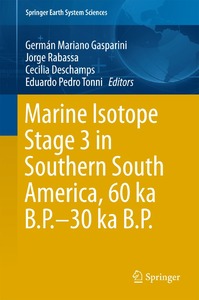Por favor, use este identificador para citar o enlazar este ítem:
https://repositorio.uca.edu.ar/handle/123456789/18052| Título: | Abrupt climate changes during the marine isotope stage 3 (MIS 3) | Autor: | Agosta, Eduardo Andrés Compagnucci, Rosa Hilda |
Palabras clave: | CAMBIO CLIMATICO; OCEANO ATLANTICO; ISOTOPOS MARINOS; CIRCULACION OCEANICA; CIRCULACION ATMOSFERICA | Fecha de publicación: | 2016 | Editorial: | Springer Earth System Sciences | Cita: | Agosta, E.A., Compagnucci, R.H. (2016). Abrupt climate changes during the marine isotope stage 3 (MIS 3). Postprint del capítulo publicado en: Gasparini, G., Rabassa, J., Deschamps, C., Tonni, E. (eds). Marine Isotope Stage 3 in Southern South America, 60 KA B.P.-30 KA B.P.. Springer Earth System Sciences. Springer, Cham. doi:10.1007/978-3-319-40000-6_5. Disponible en: https://repositorio.uca.edu.ar/handle/123456789/18052 | Resumen: | Abstract The climate in the North Atlantic Ocean during the Marine Isotope Stage 3 (MIS 3)—roughly between 80,000 years before present (B.P.) and 20,000 years B.P., within the last glacial period—is characterized by great instability, with opposing climate transitions including at least six colder Heinrich (H) events and fourteen warmer Dansgaard–Oeschger (D-O) events. Periodic longer cooling cycles encompassing two D-O events and ending in a colder Heinrich episode occurred lasting about 10 to 15 ky each, known as the Bond cycle. Heinrich events occurred less frequently than D-O events. These were recurrent every 1.5 ky on average, while *10 ky elapsed between two H events. Neither of the two types of events is strictly periodical, however. After H events abrupt shifted to warmer climate, the D-O events followed immediately. During an H event, abnormally large amounts of rock debris transported by icebergs were deposited as layers at the bottom of the North Atlantic Ocean. The various theories on the causes include factors internal to the dynamics of ice sheets, and external factors such as changes in the solar flux and changes in the Atlantic Meridional Overturning Circulation (AMOC). The latter is the most robust hypothesis. At certain times, these ice sheets released large amounts of freshwater into the North Atlantic Ocean. Heinrich events are an extreme example of this, when the Laurentide ice sheet disgorged excessively large amounts of freshwater into the Labrador Sea in the form of icebergs. These freshwater dumps reduced ocean salinity enough to slow down deep-water formation and AMOC. Since AMOC plays an important role in transporting heat northward, a slowdown would cause the North Atlantic Ocean to cool. Later, as the addition of freshwater decreased, ocean salinity and deep-water formation increased and climate conditions recovered. During the D-O events, the high-latitude warming occurred abruptly (probably in decades to centuries), reaching temperatures close to interglacial conditions. Even though H and D-O events seemed to have been initiated in the North Atlantic Ocean, they had a global footprint. Global climate anomalies were consistent with a slowdown of AMOC and reduced ocean heat transport into the northern high latitudes. The bipolar pattern with warming conditions in the Northern Hemisphere (NH) and cooling in the Southern Hemisphere (SH) is discussed from the information published by various authors who have used the limited data available for the SH, and palaeoclimatic simulations obtained by numerical modelling. Results show that the SH mid-latitude anomalies presented much smaller magnitude than those of the NH. | URI: | https://repositorio.uca.edu.ar/handle/123456789/18052 | ISBN: | 9783319400006 (online) 9783319399980 (impreso) |
Disciplina: | INGENIERIA AMBIENTAL | DOI: | 10.1007/978-3-319-40000-6_5 | Derechos: | Acceso restringido | Fuente: | Gasparini, G., Rabassa, J., Deschamps, C., Tonni, E. (eds). Marine Isotope Stage 3 in Southern South America, 60 KA B.P.-30 KA B.P.. Springer Earth System Sciences. Springer, Cham. |
| Aparece en las colecciones: | Libros/partes de libro |
Ficheros en este ítem:
| Fichero | Descripción | Tamaño | Formato | Login |
|---|---|---|---|---|
| abrupt-climate-changes.pdf | 1,12 MB | Adobe PDF | SOLICITAR ACCESO | |
| tapa-abrupt-climate-changes.jpg | 143,36 kB | JPEG |  Visualizar/Abrir |
Este ítem está sujeto a una Licencia Creative Commons

